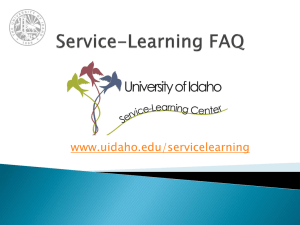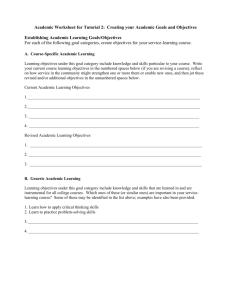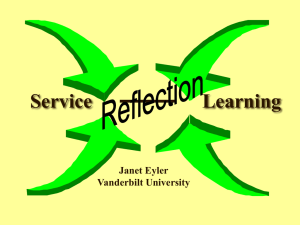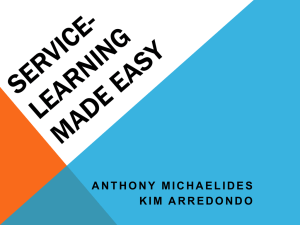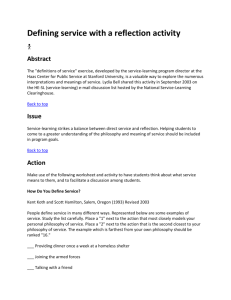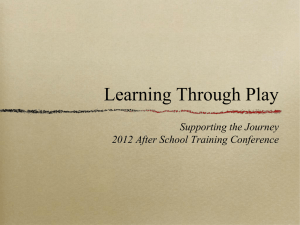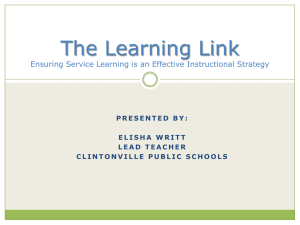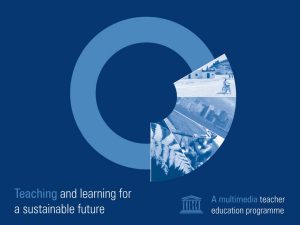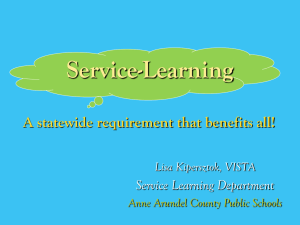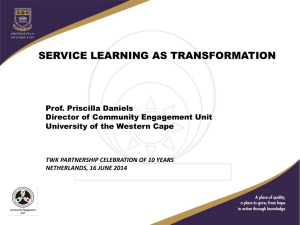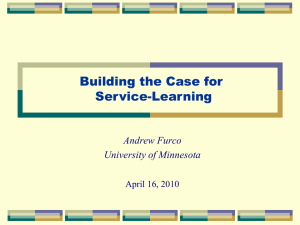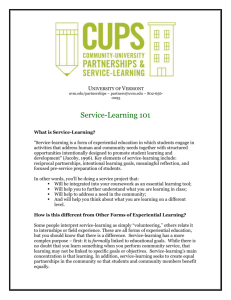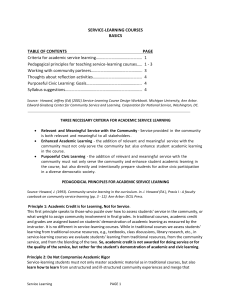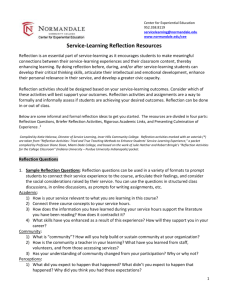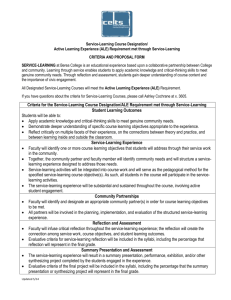Service Learning in Higher Education
advertisement
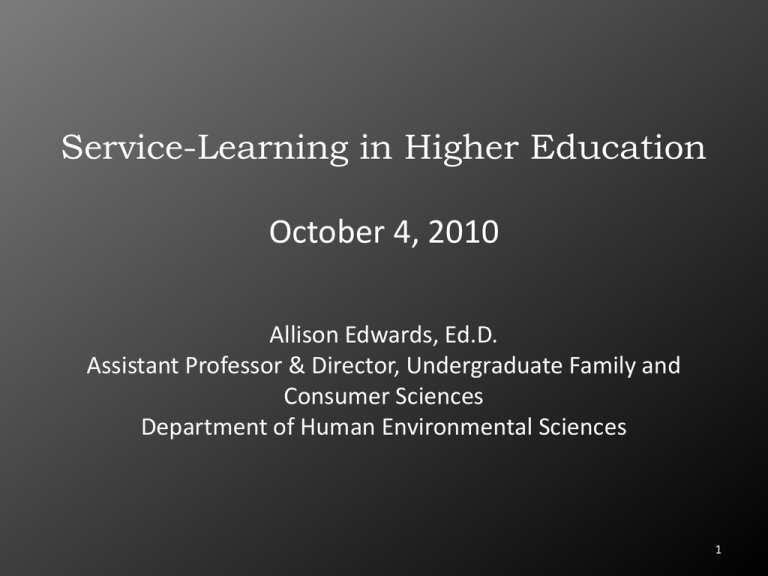
Service-Learning in Higher Education October 4, 2010 Allison Edwards, Ed.D. Assistant Professor & Director, Undergraduate Family and Consumer Sciences Department of Human Environmental Sciences 1 Is service-learning different from experiential learning? 2 Experiential Learning In Experiential Learning, • knowledge is continuously created through the transformation of experiences; • learning occurs through action; • new experiences must be integrated with past experiences through on-going reflection for true experiential learning to occur. (King & Kitchener, 2004; Kolb, 1984; Dewey, 1938) 3 Experiential Learning: Common Types Practicum ServiceLearning Travel/Field Study Cooperative Education Internship Experiential Learning 4 Service-Learning – What is it? A form of experiential learning that encourages intellectual development and civic engagement through student interactions with real-world problems. – Praxis: Formation of knowledge through critical, realitybased action and reflection (Connecting theory to practice) – Reciprocal: Learning reinforces the service, and the service reinforces the learning. (American Association of Higher Education, 1997; Freire, 1973; Prentice & Garcia, 2000) 5 Service-Learning… Service-Learning includes: • • • • • • • • active, meaningful participations, purposefully organized experiences, a focus on community needs, academic curriculum focus, integration into course objectives, structured time for on-going reflection, opportunities for application of skills and knowledge, development of civic responsibility. (Corporation for National and Community Service, 2008.; Howard, 1998; Madsen, 2004; Weigert, 1998) 6 Service-Learning as a Viable Pedagogy Benefits to students include: • intellectual growth, • greater understanding of course concepts • personal development & epistemological transformation, • social commitment & civic responsibility (serve the dear neighbor, and • appreciation for diversity. (Astin, et al., 2000; Eyler & Giles, 1998; Holland, 2001; Hughes, 2001; Markus, Arbor, Howard & King, 1993; Rhoads, 1998) 7 Service-Learning: • “My eyes were opened to a different world and to situations that were beyond control. These women did not ask to be put in this situation. A lot of the time I just thought they [specific population] were lazy. It really gave me a different outlook on people. Life is not always hard; somebody else is always fighting a harder battle” (Participant Interview 2). • “I think this experience [service-learning] is very important. I do think that when you are in a classroom all the time and getting stuff out of a book you do not really know how to apply the information until you are in a situation where you need it. I think that is very important” (Participant Interview 7). 8 Quality Service-Learning Experiences Include: • Student Input: student participation in the selection of the service site and community need to address. • Structure: the setting of the service, type of service, preparations the student receives prior to the experience and the experiences/tasks during the service. • Application: extent to which students are able to link the classroom curriculum to the community experience. • Reflection: the on-going connection between the service and academic learning (reflection before, during and after ). • Diversity: opportunity to work with people from diverse groups during the service. (Eyler & Giles, 1999; Schine, 1990; The Corporation for National and Community Service, 2008) 9 Our Roles as Educators • Organize and facilitate experiences that will ultimately lead to students’ meaningful learning. (Smith, 2003) • Preparing graduates to critically analyze, transfer and apply knowledge and skills to real-life situations. ( Baxter Magolda, 2006; Ngai 2006; Boyer, 1994) • Create experiences that will lead to educational goals through hands-on and active learning, reflective thinking and shared communication. (Smith, 2003) 10 Resources Higher Education – Service Learning List Serve http://lists.etr.org/read/?forum=he-sl Campus Compact http://www.compact.org/ – Dedicated to promoting community service, civic engagement, and servicelearning in higher education. The National Center for Service Learning http://www.servicelearning.org/ – Service learning resources, lessons, syllabi, scholarly resources and faculty tool kit. Corporation for National & Community Service http://www.nationalservice.gov/Default.asp – Supports the American culture of citizenship, service, and responsibility. 11 References Astin, A.W., Sax, L.J., & Avalos, J. (2003). Long-term effects are affected by service participation. Journal of College Student Development, 39(3), 251-263. Baxter Magolda, M. B. (2006). Evolution of a constructivist conceptualization of epistemological reflection. Educational Psychologist, 39(1), 31-42. Boyer, E. L. (1994, March 9). Creating the new American college. Chronicle of Higher Education, p. A48. Dewey, J. (1938). Experience and Education. New York: Collier Books. Eyler, J., & Giles, E. G. (1998). A service learning research agenda for the next five years. [Monograph] New Directions for Teaching and Learning, 73. San Francisco: Jossey-Bass. King, P. M. & Kitchener, K. S. (2004). Reflective judgment: Theory and research on the development of epistemic assumptions through adulthood. Educational Psychologist, 39(1), 5-18. Kolb, D. A. (1984). Experiential learning: Experiences as the source of learning and development. Inglewood Cliffs, NJ: Prentice-Hall. Ngai, S. S. (2006, Spring). Service-learning, personal development, and social commitment: A case study of university students in Hong Kong. Adolescence, 41(161), 165-174. Markus, G., Arbor, A., Howard, J. P. E., & King. D. C. (1993). Integrating community service and classroom instruction enhances learning: Results from an experiment. Education Evaluation & Policy Analysis, 15, 410-419. Rhoads, R. A., & Howard, J. P. F. (1998). Academic service learning: A pedagogy of action and Reflection. [Monograph] New Directions for Teaching and Learning, 73, San Francisco: Jossey-Bass. Ryerson University, (n.d.). Experiential learning outcomes. Retrieved September 21, 2009, from http://www.ryerson.ca/experiential_learning/el_at_ryerson/outcomes/ Smith, M. K. (2003). Introducing informal education. Retrieved September 18, 2009, from http://www.infed.org/iintro.htm 12 “I hear and I forget, I see and I remember, I do and I understand”. (Confucius) 13
